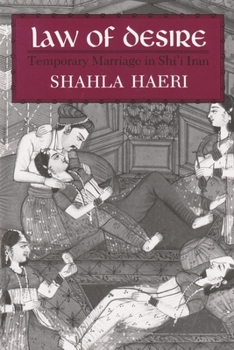Law of Desire: Temporary Marriage in Shi'i Iran
Select Format
Select Condition 
Book Overview
Law of Desire explores an institution in which sexuality, morality, religious rules, secular laws, and cultural practices converge. Drawing on rich interviews that would have been denied a Western... This description may be from another edition of this product.
Format:Paperback
Language:English
ISBN:0815624832
ISBN13:9780815624837
Release Date:November 1989
Publisher:Syracuse University Press
Length:276 Pages
Weight:0.90 lbs.
Dimensions:0.7" x 6.1" x 9.0"
Customer Reviews
3 ratings
An authoritative account of a little-known practice
Published by Thriftbooks.com User , 15 years ago
Law of desire is an excellent, scholarly account of the practice of temporary marriage among Shi'ite muslims. It shows, skillfully, how a temporary or "contractual" marriage provides a practical, realistic "solution" to the needs of men and women in Muslim society. It does not shy away from showing how cultural practices and social pressures can erode the position of women in these temporary marriages, which, although offering legitimacy to any children conceived, do not prevail over the chauvinism and misogyny which seem to be characteristic of many Muslim societies. It should be seen as a realistic, if flawed, solution adopted by the more progressive Islam of the shi'ite societies. It seems to be better utilized by divorced or widowed women for whom re-marriage would subject them to long-term domination by a spouse. It does also allow a degree of autonomy and sexual freedom to such women that is strikingly absent in other Islamic societies. The author has provided a remarkably balanced view of mut'a and highlighted the diversity of practices within the Islamic world.
An interesting book about desire and morality
Published by Thriftbooks.com User , 20 years ago
This study attempts a cultural and critical understanding of an important and controversial institution of shi'ite Islam, mut'a. Mut'a often known as "fixed term" or "temporary" marriage is a contract between a man and an unmarried woman, in which both the the PERIOD that the marriage shall last and the MAHR (the wedding gift which the woman gets from the man) must be specified. If during Mut'a they have any offspring, these children are licit and are entitled to receive inheritance from both parents. Mut'a with a virgin girl is highly discouraged without the permission of her legal guardian. The term of the marriage is as long - or as short - as the partners wish it to be. At the end of the specified period the partners may choose to part company witout any divorce or they may extend the mut'a or may even choose to marry permanently. Linda Walbridge (Without Forgetting the Imam: Lebanese Shi'Ism in an American Community - ISBN 0814326757) tells of a young man, hoping for sex with a woman without breaking the rules of his religion or forming a permanent bond with a non-Muslim. He propositioned a number of American women with the prospect of a temporary marriage and "all of them laughed at him except one," and she ended up converting to Islam and getting permanently married to him. The custom of mut'a was practiced during and after the Prophet of Islam and was outlawed by the second Caliph Umar for certain reasons in the seventh century AD, but the Shi'ites continue to consider his command as legally non-binding and religiously ineffective. In response, they argue that mut'a marriage is sanctioned in the Qur'an 4:24 and that it was permitted by the prophet Muhammad himself. Despite the early prohibition of the institution, the custom of fixed term marriage did not completely die out among the Sunni Muslims either. Nor was it left unchallenged by some secular leaders. As per the Author, in the ninth century the Caliph Mamun proclaimed Mut'a marriage legal once again, but faced with stiff opposition and the threat of denunciation from the Sunni Ulema, he was forced to withdraw his edict. Often, Mut'a is translated as marriage of pleasure but its main purpose is explained by Shi'ite scholars as saving the subject from sinning and the society from sexual corruption. Ayatollah Ja'afar Sobhani (Doctrines of Shi'a Islam - ISBN 1860647804) writes : ..a solution for crises relating to sexuality. Let us take, for example the case of a young man living away from his country, either studying or trying to find work, and he does not have means to enter into a permanent marriage. What should he do? He has to choose one of the following three options: either exert self-control and deprive himself of sexual pleasure; or enter into illicit affairs with immoral women; or make use of the possibility of mut'a, according to strict conditions with a virtuous lady. The focus of the book is on the perception of the institution by some Iranian men and women whose lives h
The Importance of Paternity
Published by Thriftbooks.com User , 23 years ago
Although an insightful book, it overlooked a very important issue, that of Paternity. Polygamous and temporary marriages in Iran although legal are socially frowned upon within mainstream society. They are prevalent, although in small percentages amongst the very rich and the very poor, I guess both having very little to lose. A temporary marriage is socially akin to an illicit affair.When a man takes a second wife, he hides it. Of course in any society there should be room fo fully-grown adults to live theur lives as they choose. But children should be protected. This above all is the central issue. In all such cases fathers are made legally and socially responsible for children that are born within such liaisons.






